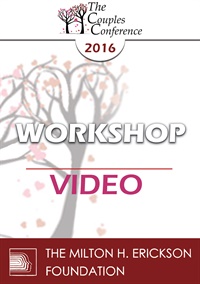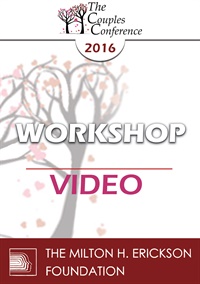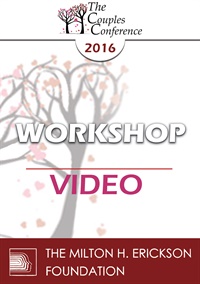- Average Rating:
- Not yet rated
- Topic Areas:
- Couples Therapy | Workshops | Deception | Psychobiological Approach to Couples Therapy (PACT)
- Categories:
- Couples Conference | Couples Conference 2016 | Pioneers in Couples and Family Therapy
- Faculty:
- Stan Tatkin, PsyD, MFT
- Course Levels:
- Master Degree or Higher in Health-Related Field
- Duration:
- 02:10:07
- Format:
- Audio and Video
- Original Program Date:
- May 13, 2016
- Short Description:
- This session explores deception in couples therapy through a psychobiological lens, integrating attachment, arousal regulation, and neuroscience. Tatkin highlights the limits of conscious awareness in relational conflict and the role of implicit memory and nonverbal cues in uncovering hidden agendas. Using tools like digital video analysis, cross-questioning, and presumptive statements, therapists are guided to promote secure functioning and foster repair following betrayal.
- Price:
-
Sale is $29.00
price reduced from Base Price - $59.00
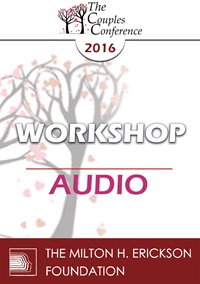
- Average Rating:
- Not yet rated
- Topic Areas:
- Neuroscience | Attachment | Workshops | Experiential Therapy | Mindfulness | Couples Therapy
- Categories:
- Couples Conference | Couples Conference 2016
- Faculty:
- Rob Fisher, MFT
- Duration:
- 01:54:14
- Format:
- Audio Only
- Original Program Date:
- May 13, 2016
- Short Description:
- Now that you understand the neuropsychology of attachment, how are you going to use it in a session where one partner is yelling at the other for abandoning him/her who is in turn trying to take refuge under the coach? Learn how to put theory into practice using an experiential approach to explore old neural circuitry around attachment and build new pathways. We will be using the present moment and mindfulness integrated into therapy to slow things down and rewire the brain.
- Price:
- $15.00 - Base Price
- Average Rating:
- Not yet rated
- Topic Areas:
- Trauma | Workshops | Intimacy | Relationships | Couples Therapy
- Categories:
- Couples Conference | Couples Conference 2016 | Pioneers in Couples and Family Therapy
- Faculty:
- Terry Real, LICSW
- Course Levels:
- Master Degree or Higher in Health-Related Field
- Duration:
- 02:05:42
- Format:
- Audio and Video
- Original Program Date:
- May 14, 2016
- Short Description:
- This workshop outlines a three-phase model for healing trauma and deepening intimacy in relationships. It focuses on using leverage with resistant clients, addressing early and relational trauma, and guiding deep character change in the presence of a partner. Emphasis is placed on managing personality disorders, using rituals in therapy, and holding high relational standards—especially when working with boys—to foster long-term relational health.
- Price:
-
Sale is $29.00
price reduced from Base Price - $59.00
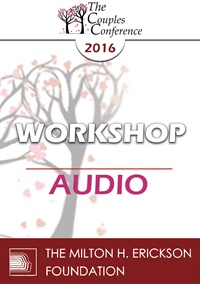
- Average Rating:
- Not yet rated
- Topic Areas:
- Emotionally Focused Therapy (EFT) | Workshops | Affairs | Couples Therapy | Sex and Sexuality
- Categories:
- Couples Conference | Couples Conference 2016
- Faculty:
- Scott R. Woolley, PhD
- Duration:
- 01:16:00
- Format:
- Audio Only
- Original Program Date:
- May 14, 2016
- Short Description:
- Engaging withdrawn men in therapy is often challenging, particularly when the man is engaged in compulsive sexual behaviors such as affairs and pornography. Therapists will learn to how to engage withdrawers both with their own internal experience and disowned aspects of the self and with their partner. Therapy video will be used to demonstrate the process.
- Price:
- $15.00 - Base Price
- Average Rating:
- Not yet rated
- Topic Areas:
- Workshops | Couples Therapy | Gender | Relationships | Marriage
- Categories:
- Couples Conference | Couples Conference 2016
- Faculty:
- Pat Love, EdD
- Course Levels:
- Master Degree or Higher in Health-Related Field
- Duration:
- 01:50:23
- Format:
- Audio and Video
- Original Program Date:
- May 15, 2016
- Short Description:
- Explore research findings related to mate selection as well as happiness, satisfaction and longevity in committed relationships. Case studies and clinical applications will be utilized.
- Price:
-
Sale is $29.00
price reduced from Base Price - $59.00
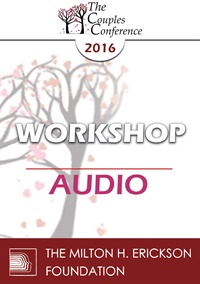
- Average Rating:
- Not yet rated
- Topic Areas:
- Workshops | Deception | Differentiation | Couples Therapy
- Categories:
- Couples Conference | Couples Conference 2016 | Pioneers in Couples and Family Therapy
- Faculty:
- Ellyn Bader, PhD
- Duration:
- 02:00:14
- Format:
- Audio Only
- Original Program Date:
- May 15, 2016
- Short Description:
- Everybody lies. Some lies are loving and harmless. But, others are enormously destructive. Couples’ patterns of deception often begin innocently but end in couples destroying the love they once had. Self- deception, conflict avoidance and felony lies all undermine commitment and connection. Learn to identify and disrupt deception, confront evasiveness and hypocrisy and facilitate differentiation.
- Price:
- $15.00 - Base Price
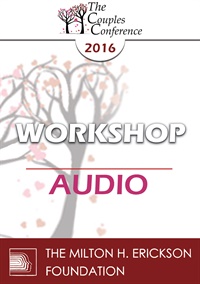
- Average Rating:
- Not yet rated
- Topic Areas:
- Couples Therapy | Attachment | Workshops | Relationships
- Categories:
- Couples Conference | Couples Conference 2016 | Pioneers in Couples and Family Therapy
- Faculty:
- Terry Real, LICSW
- Duration:
- 01:57:43
- Format:
- Audio Only
- Original Program Date:
- May 15, 2016
- Short Description:
- This workshop on attachment and Relational Life Therapy examines the dynamics between pursuers and distancers, focusing on vulnerability, self-disclosure, and boundary issues. Participants learn to use the relational grid to assess client positioning, and explore tailored strategies for love avoidance rooted in avoidance or enmeshment. The session also highlights leverage in therapy, the impact of early family roles like the “lost child,” and upcoming RLT training opportunities, including collaboration with Esther Perel.
- Price:
- $15.00 - Base Price
Credit available - Click Here for more information
- Average Rating:
- Not yet rated
- Topic Areas:
- Attachment | Emotionally Focused Therapy (EFT) | Workshops | Affairs | Couples Therapy | Relationships
- Categories:
- Couples Conference | Couples Conference 2016
- Faculty:
- Scott R. Woolley, PhD
- Course Levels:
- Master Degree or Higher in Health-Related Field
- Duration:
- 01:09:00
- Format:
- Audio and Video
- Original Program Date:
- May 15, 2016
- Short Description:
- Affairs can have a devastating impact on couple relationships. Emotionally Focused Therapy provides a powerful way to intervene when there has been an affair. This workshop provides a typology of different types of affairs and treatment strategies for each type. Using video and case demonstration, participants will learn how to identify, manage, and bring healing and safety to couple relationships when there has been an affair.
- Price:
-
Sale is $29.00
price reduced from Base Price - $59.00

- Average Rating:
- Not yet rated
- Topic Areas:
- Keynotes | Couples Therapy | Infidelity | Crisis Therapy
- Categories:
- Couples Conference | Couples Conference 2017 | Pioneers in Couples and Family Therapy
- Faculty:
- Ellyn Bader, PhD
- Duration:
- 23:41
- Format:
- Audio Only
- Original Program Date:
- Mar 31, 2017
- Short Description:
- Ellyn will present a video of a first session with a couple about to separate after a third discovered infidelity. The session, conducted by Ellyn Bader and Peter Pearson focuses on illuminating how one partner’s unresolved family of origin issues create pain for both partners, contribute to infidelity and inhibit the development of the relationship. After the video presentation, Janis Spring will comment. We all learn more when we see therapeutic work discussed from multiple perspectives.
- Price:
- $15.00 - Base Price
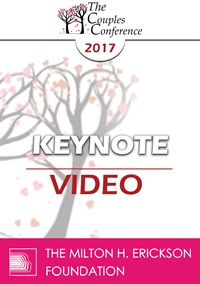
- Average Rating:
- Not yet rated
- Topic Areas:
- Couples Therapy | Keynotes | Experiential Therapy | Evocative Communication | Metaphors
- Categories:
- Couples Conference | Couples Conference 2017
- Faculty:
- Jeffrey Zeig, PhD
- Course Levels:
- Master Degree or Higher in Health-Related Field
- Duration:
- 55:49
- Format:
- Audio and Video
- Original Program Date:
- Mar 31, 2017
- Short Description:
- When information and advice fail to promote change, an experiential approach can foster adaptive realizations. Learn nonverbal and metaphoric methods to enliven your approach.
- Price:
-
Sale is $29.00
price reduced from Base Price - $59.00

- Average Rating:
- Not yet rated
- Topic Areas:
- Couples Therapy | Keynotes | Experiential Therapy | Metaphors | Evocative Communication
- Categories:
- Couples Conference | Couples Conference 2017
- Faculty:
- Jeffrey Zeig, PhD
- Duration:
- 55:49
- Format:
- Audio Only
- Original Program Date:
- Mar 31, 2017
- Short Description:
- When information and advice fail to promote change, an experiential approach can foster adaptive realizations. Learn nonverbal and metaphoric methods to enliven your approach.
- Price:
- $15.00 - Base Price
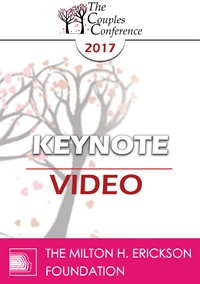
- Average Rating:
- Not yet rated
- Topic Areas:
- Addiction | Deception | Keynotes | Psychobiological Approach to Couples Therapy (PACT) | Couples Therapy | Infidelity
- Categories:
- Couples Conference | Couples Conference 2017 | Pioneers in Couples and Family Therapy
- Faculty:
- Stan Tatkin, PsyD, MFT
- Course Levels:
- Master Degree or Higher in Health-Related Field
- Duration:
- 55:09
- Format:
- Audio and Video
- Original Program Date:
- Apr 01, 2017
- Short Description:
- This presentation examines deception in couple therapy through psychobiological and neurobiological frameworks. Tatkin advocates for cross-disciplinary learning—drawing from neuroscience and animal behavior—to sharpen clinical perception. Emphasis is placed on detecting deception early through micro expressions, behavioral cues, and video analysis, offering therapists strategic tools for addressing affairs, addictions, and trust breaches in relational work.
- Price:
-
Sale is $29.00
price reduced from Base Price - $59.00

- Average Rating:
- Not yet rated
- Topic Areas:
- Addiction | Deception | Keynotes | Psychobiological Approach to Couples Therapy (PACT) | Couples Therapy | Infidelity
- Categories:
- Couples Conference | Couples Conference 2017 | Pioneers in Couples and Family Therapy
- Faculty:
- Stan Tatkin, PsyD, MFT
- Duration:
- 55:09
- Format:
- Audio Only
- Original Program Date:
- Apr 01, 2017
- Short Description:
- This presentation examines deception in couple therapy through psychobiological and neurobiological frameworks. Tatkin advocates for cross-disciplinary learning—drawing from neuroscience and animal behavior—to sharpen clinical perception. Emphasis is placed on detecting deception early through micro expressions, behavioral cues, and video analysis, offering therapists strategic tools for addressing affairs, addictions, and trust breaches in relational work.
- Price:
- $15.00 - Base Price
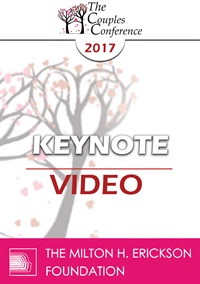
- Average Rating:
- Not yet rated
- Topic Areas:
- Keynotes | Attention Deficit Disorder (ADD) | Relationships | Couples Therapy
- Categories:
- Couples Conference | Couples Conference 2017
- Faculty:
- Daniel Amen, MD
- Course Levels:
- Master Degree or Higher in Health-Related Field
- Duration:
- 58:35
- Format:
- Audio and Video
- Original Program Date:
- Apr 01, 2017
- Short Description:
- This keynote explores how untreated ADHD shapes relationships, intimacy, and family dynamics. Participants learn how impulsivity, distractibility, and emotional reactivity can fuel conflict and disconnection, and how brain-based assessment and treatment can restore empathy and stability. The session offers practical strategies for managing attention issues, improving communication, and fostering healthier, more connected partnerships.
- Price:
-
Sale is $29.00
price reduced from Base Price - $59.00

- Average Rating:
- Not yet rated
- Topic Areas:
- Keynotes | Attention Deficit Disorder (ADD) | Relationships | Couples Therapy
- Categories:
- Couples Conference | Couples Conference 2017
- Faculty:
- Daniel Amen, MD
- Duration:
- 58:35
- Format:
- Audio Only
- Original Program Date:
- Apr 01, 2017
- Short Description:
- This keynote explores how untreated ADHD shapes relationships, intimacy, and family dynamics. Participants learn how impulsivity, distractibility, and emotional reactivity can fuel conflict and disconnection, and how brain-based assessment and treatment can restore empathy and stability. The session offers practical strategies for managing attention issues, improving communication, and fostering healthier, more connected partnerships.
- Price:
- $15.00 - Base Price
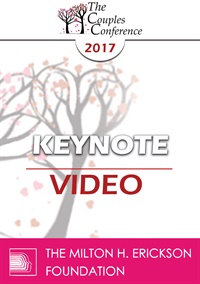
- Average Rating:
- Not yet rated
- Topic Areas:
- Couples Therapy | Trauma | Keynotes | Intimacy | Trauma Studies
- Bundle(s):
- Learning Track - Turn Down the Trauma
- Categories:
- Couples Conference | Couples Conference 2017 | Pioneers in Couples and Family Therapy
- Faculty:
- Janina Fisher, PhD
- Course Levels:
- Master Degree or Higher in Health-Related Field
- Duration:
- 54:20
- Format:
- Audio and Video
- Original Program Date:
- Apr 02, 2017
- Short Description:
- Fisher explores trauma's profound impact on couples' relationships, revealing how past experiences shape attachment patterns, trigger conflicts, and disrupt intimacy. Through sensory motor psychotherapy, she offers innovative strategies for healing, emphasizing safety, understanding non-verbal memories, and rebuilding connection.
- Price:
-
Sale is $29.00
price reduced from Base Price - $59.00

- Average Rating:
- Not yet rated
- Topic Areas:
- Couples Therapy | Trauma | Keynotes | Intimacy | Trauma Studies
- Categories:
- Couples Conference | Couples Conference 2017 | Pioneers in Couples and Family Therapy
- Faculty:
- Janina Fisher, PhD
- Duration:
- 54:20
- Format:
- Audio Only
- Original Program Date:
- Apr 02, 2017
- Short Description:
- Fisher explores trauma's profound impact on couples' relationships, revealing how past experiences shape attachment patterns, trigger conflicts, and disrupt intimacy. Through sensory motor psychotherapy, she offers innovative strategies for healing, emphasizing safety, understanding non-verbal memories, and rebuilding connection.
- Price:
- $15.00 - Base Price

- Average Rating:
- Not yet rated
- Topic Areas:
- Infidelity | Topical Panels | Couples Therapy | Deception
- Categories:
- Couples Conference | Couples Conference 2017 | Pioneers in Couples and Family Therapy
- Faculty:
- Alexandra Katehakis, MA, MFT | Marty Klein, PhD | Stan Tatkin, PsyD, MFT
- Course Levels:
- Master Degree or Higher in Health-Related Field
- Duration:
- 56:45
- Format:
- Audio and Video
- Original Program Date:
- Mar 31, 2017
- Short Description:
- This panel explores infidelity as a multifaceted breach of trust, extending beyond sexual betrayal. Drawing from psychodynamic and neurobiological perspectives, the presenters examine deception, gaslighting, and confabulation. Clinical focus includes managing countertransference, maintaining therapeutic neutrality, and guiding partners through accountability, emotional repair, and post-crisis growth.
- Price:
-
Sale is $29.00
price reduced from Base Price - $59.00

- Average Rating:
- Not yet rated
- Topic Areas:
- Infidelity | Topical Panels | Couples Therapy | Deception
- Categories:
- Couples Conference | Couples Conference 2017 | Pioneers in Couples and Family Therapy
- Faculty:
- Alexandra Katehakis, MA, MFT | Marty Klein, PhD | Stan Tatkin, PsyD, MFT
- Duration:
- 56:45
- Format:
- Audio Only
- Original Program Date:
- Mar 31, 2017
- Short Description:
- This panel explores infidelity as a multifaceted breach of trust, extending beyond sexual betrayal. Drawing from psychodynamic and neurobiological perspectives, the presenters examine deception, gaslighting, and confabulation. Clinical focus includes managing countertransference, maintaining therapeutic neutrality, and guiding partners through accountability, emotional repair, and post-crisis growth.
- Price:
- $15.00 - Base Price

- Average Rating:
- Not yet rated
- Topic Areas:
- Couples Therapy | Topical Panels | Therapist Development | Clinical Psychology | Individual Therapy
- Categories:
- Couples Conference | Couples Conference 2017 | Pioneers in Couples and Family Therapy
- Faculty:
- Ellyn Bader, PhD | Sue Diamond, MA, RCC | Janis Abrahms Spring, PhD, ABPP
- Duration:
- 58:21
- Format:
- Audio Only
- Original Program Date:
- Apr 01, 2017
- Short Description:
- Couples treatment requires an understanding of interpersonal dynamics. Clinicians need to understand the benefits and liabilities of couples vs. individual therapy, and have a mechanism for deciding when to use each approach.
- Price:
- $15.00 - Base Price

- Average Rating:
- Not yet rated
- Topic Areas:
- Couples Therapy | Topical Panels | Therapist Development | Clinical Psychology | Individual Therapy
- Bundle(s):
- Learning Track - Couples Starter Kit
- Categories:
- Couples Conference | Couples Conference 2017 | Pioneers in Couples and Family Therapy
- Faculty:
- Janis Abrahms Spring, PhD, ABPP | Ellyn Bader, PhD | Sue Diamond, MA, RCC
- Course Levels:
- Master Degree or Higher in Health-Related Field
- Duration:
- 58:21
- Format:
- Audio and Video
- Original Program Date:
- Apr 01, 2017
- Short Description:
- Couples treatment requires an understanding of interpersonal dynamics. Clinicians need to understand the benefits and liabilities of couples vs. individual therapy, and have a mechanism for deciding when to use each approach.
- Price:
-
Sale is $29.00
price reduced from Base Price - $59.00

- Average Rating:
- Not yet rated
- Topic Areas:
- Topical Panels | Couples Therapy | Boundaries
- Categories:
- Couples Conference | Couples Conference 2017 | Pioneers in Couples and Family Therapy
- Faculty:
- Janina Fisher, PhD | Martha Kauppi, MS MFT | Rick Miller, MSW
- Duration:
- 58:38
- Format:
- Audio Only
- Original Program Date:
- Apr 02, 2017
- Short Description:
- A panel exploring internal and external boundaries, consent, and communication across different relationship structures. Experts Rick Miller, Martha Kauppi, and Janina Fisher discuss boundary challenges in gay male, polyamorous, and trauma-informed contexts, focusing on body awareness, self-differentiation, and therapeutic approaches to vulnerability.
- Price:
- $15.00 - Base Price

- Average Rating:
- Not yet rated
- Topic Areas:
- Couples Therapy | Topical Panels | Boundaries
- Bundle(s):
- Learning Track - Couples Starter Kit
- Categories:
- Couples Conference | Couples Conference 2017 | Pioneers in Couples and Family Therapy
- Faculty:
- Martha Kauppi, MS MFT | Rick Miller, MSW | Janina Fisher, PhD
- Course Levels:
- Master Degree or Higher in Health-Related Field
- Duration:
- 58:38
- Format:
- Audio and Video
- Original Program Date:
- Apr 02, 2017
- Short Description:
- A panel exploring internal and external boundaries, consent, and communication across different relationship structures. Experts Rick Miller, Martha Kauppi, and Janina Fisher discuss boundary challenges in gay male, polyamorous, and trauma-informed contexts, focusing on body awareness, self-differentiation, and therapeutic approaches to vulnerability.
- Price:
-
Sale is $29.00
price reduced from Base Price - $59.00
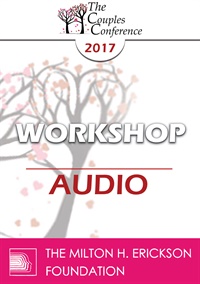
- Average Rating:
- Not yet rated
- Topic Areas:
- Addiction | Workshops | Love | Relationships | Attachment | Couples Therapy | Sex and Sexuality | Attunement
- Categories:
- Couples Conference | Couples Conference 2017
- Faculty:
- Alexandra Katehakis, MA, MFT
- Duration:
- 1:57:10
- Format:
- Audio Only
- Original Program Date:
- Mar 31, 2017
- Short Description:
- Sex addiction destroys trust in relationships, traumatizing the partner, the sex addict, and the family system. Betrayal is an attachment injury that topples the regulatory systems of both parties, and when relational trauma is left untreated, both parties and the family system will suffer. Thus, when acute emotional and physical symptoms become chronic, treatment becomes more difficult making the prognosis for restoring the coupleship poor. Rapid intervention and interactive regulation between the couple is essential for relational healing to begin immediately. Attunement, communication, and empathy (ACE) are the three-pronged stool that supports the long, and sometimes arduous journey to restoring trust.
- Price:
- $15.00 - Base Price
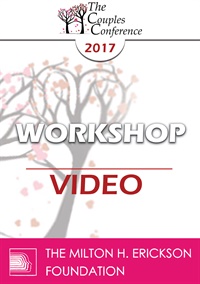
- Average Rating:
- Not yet rated
- Topic Areas:
- Couples Therapy | Workshops | Betrayal | Psychobiological Approach to Couples Therapy (PACT)
- Categories:
- Couples Conference | Couples Conference 2017 | Pioneers in Couples and Family Therapy
- Faculty:
- Stan Tatkin, PsyD, MFT
- Course Levels:
- Master Degree or Higher in Health-Related Field
- Duration:
- 2:08:41
- Format:
- Audio and Video
- Original Program Date:
- Mar 31, 2017
- Short Description:
- This workshop examines betrayal in its many forms—infidelity, deception, secrecy—as a core challenge in couple therapy. Using a psychobiological lens, Tatkin emphasizes moving from self- to co-regulation and fostering secure-functioning partnerships built on transparency and mutual care. Techniques like crossing, declarations, and the “King and Queen” exercise help therapists structure repair and guide couples through trust restoration.
- Price:
-
Sale is $29.00
price reduced from Base Price - $59.00


